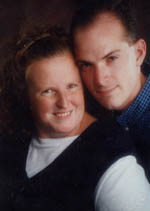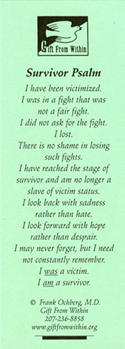Dear Friends:
| Below are stories written by survivors of trauma. We applaud their courage because they are sharing painful moments from their lives. When a friend or loved one has been through a traumatic event it is not always easy to know what to say or do. These survivors have written about how friends and loved ones were comforting at the time of their trauma, comments from friends and loved ones that were appropriately helpful. Their experiences are lessons for all of us. If you would like to submit your story please click here. Here are their stories. | ||||||||||||||||||||||||||||||||||||
| I was 49 years old when I was diagnosed with PTSD, Anxiety and Depression. Thus began one of the hardest journeys of my life. After that initial visit, I began to have nightmares and flashbacks about my very brutal marriage including the attempt on my life (as our two year old stood watching) and subsequent Rape by my husband. Very little was spoken of PTSD resulting from Domestic Violence. The marriage had been over for 20 years. When I questioned why/how I could’ve buried such brutality and carried on to raise my daughter, go to work and buy a home; all the normal things of everyday life, It was explained to me how the brain will protect and compartmentalize the memories until I was ready to deal with them. I used several tools to learn all I could about PTSD. I began reacting to friends and co-workers in ways that were unusual and scary. I lost 2 friends over the reactions because? I was too much work?, while I understand their responses it was another stumbling block in my attempt to recover. While I am blessed with many friends and co-workers who stand with me, allowed me to voice the worst so it was no longer a terrible secret I carried, who step in when the panic attacks begin. There are those in my life who still refuse to believe that the repressed memories weren’t a figment of my imagination. I’ve been working with an excellent therapist for 3 years now and while I often questioned his methods of engaging me to face the ramifications and realities of PTSD, I cannot argue with his results. We had 7-8 sessions of EMDR therapy which greatly helped me deal with the worst of the violent memories and move forward towards learning coping skills to deal with PTSD. I also found “The Post-Traumatic Stress Disorder Sourcebook” (written by Glenn R. Schiraldi, PHD); answered and made sense of the chaos that ensued after my diagnosis. A good friend suggested I try meditation and I found it helped center me. If you are a friend or family member of someone with this diagnosis, I encourage you to talk, listen and just be there because PTSD can make the survivor feel alone and misunderstood. Spoken from personal experience, I would not have made the progress I have without those friends and family members surrounding me. J | ||||||||||||||||||||||||||||||||||||
| “My name is Jodi. I have PTSD and a chronic disease. My disease taxes my energy and strength. PTSD affects me emotionally and I tend to isolate myself and become depressed which is not healthy. At times I find it difficult to reach out and express how I am feeling. My husband and I both work full time. Sometimes it is all I can do to get through the day at work. My husband has figured out a way to help me by answering the phone after 8 PM. He knows that my doctor has told me that I need to get all the rest all I can. My friends and family are concerned and my husband takes these calls and tells them how I am doing. He also tells them that I would love to see them and the best way to contact me is via email. It’s less tiring for me and I can do it during the day. I enjoy getting out and seeing people. Having friends that encourage me to have fun outside of my daily routines is a blessing. So I appreciate that they are accepting my situation and still want to be with me. They found a way to do it.” | ||||||||||||||||||||||||||||||||||||
 | ||||||||||||||||||||||||||||||||||||
| Jodi and Rick. Jodi is a GFW Support Pal. She is a humanitarian helping under-privileged children, and courageously battling Kidney disease. | ||||||||||||||||||||||||||||||||||||
| “I don’t know if it’s being a “Wednesday Child” or simply bad luck but I have been in the wrong place at the wrong time most of my life. At the age of ten, I experienced the 1964 Earthquake in Alaska and all the strong aftershocks that went with it. I must say that as a child, I found the whole thing quite entertaining and had absolutely no idea the devastation that would follow. What scared me the most were the reactions of adults around me, from the radio announcer screaming “don’t panic” every minute and my aunt claiming we were having “the last supper” that night it was hard to do anything but be frightened. What helped was being close to my family and my dad reading from Tom Sawyer to us every night. We had no electricity, water or heat except for a propane stove. At least we had that. Neighbors would come and huddle to stay warm. If I could suggest anything to anyone about natural disasters and children it would be to try and not inflict the fears of adults onto the kids. I have not forgotten the warmth of my dad reading that story. I have children and I’ve learned how to be loving and supportive and how to be there for my son when he was traumatized during his HS years. Three of his best friends who were related were murdered. He is dealing with this slowly and what has not been helpful from supposed friends is telling him that it’s been five years…he should be over it. Please don’t say things like that. We heal differently and not on your time schedule. I have recently taken a leave of absence from my social work job as the constant work with abused women and children was starting to be detrimental to my mental and physical health. I am dealing with anxiety and depression and other PTSD symptoms. My new job and a supportive husband allows me the time to concentrate on being the best mom I can for my children. I found helpful information on the Net and books and also found Gift from Within. I heard Dr. Ochberg’s tapes and for the first time I realize the ending of my story is hopeful. Likewise for my son. PTSD doesn’t have to be a permanent condition. That knowledge is what helps the most.” -SK | ||||||||||||||||||||||||||||||||||||
Reading the stories of sufferers I cannot help, but to think I don’t belong here. Everyone here is a survivor of trauma, and I am a family member. I will proceed with the belief that perhaps my words will mean something to someone, somewhere. My story began a long time ago, long before I realized it. I am married to a veteran. My husband served his country proudly for over twenty-three years. His troops affectionately referred to him as GI Joe. Our life was about God and Country. Everything we did was for his soldiers, their families, and to help him carry out the oath he promised to our country. I waited endless months at a time for the love of my life to return. I cried myself asleep a lot nights because I missed him so much; I followed him across the globe more than once. I was the ultimate military spouse. His third deployment was the same as all the others. X number of soldiers went off & X number came back. Usually not all the same soldiers and at different times for different reasons, this was the life we had learned to accept. It was never easy, but he always came back. My husband served three tours of war as a combat soldier. He has never been awarded a Purple Heart because he never was injured. At least this is what we were lead to believe at post-deployment. Three months after post-deployment, my life was falling apart and there was nothing I could do. I still loved him, I still supported him, and I had no idea what I was doing wrong. We had been married twenty-years; we had been through more than most people our age. Why was he so angry? He would never speak to me unless he was being mean. The tension in our home was so thick and overshadowing everything in our lives. It would get better for a little while and then get ten times worse. The only think that kept me going was my love for him and my understanding of PTSD symptoms. I brought this to his attention. I could never repeat the words he used in response. My husband had never spoken to me the way he did that day. It broke me. I walked away crushed, but I was not giving up. This continued in my life for months. I watched myself become withdrawn – as if I was on the outside looking in. The entire world I had known was gone. My last attempt to have him seek help came with the same negative outburst. Instead of walking way in a calm rational voice I told him I would be gone when he returned from his business trip. I never mentioned it again. Two days later he came home from work and told me he had made an appointment with a counselor. That was the beginning of our healing. I do not write this as a way to say you can heal! It will all be alright! We all know PTSD does not work that way. We have learned to live with PTSD in our lives. We recognize it for what it is and adjust accordingly. I want to encourage loved ones of sufferers to educate yourself about PTSD & never stop loving your sufferer. They need you more now than ever… even if their actions (or words) don’t seem so. K.G. | ||||||||||||||||||||||||||||||||||||
 | ||||||||||||||||||||||||||||||||||||
| “I am a 44-year-old male who grew up in the South but now live in the North East with my wife and children. I have a good business and doing pretty well although I have my moments of sadness. Many events take place during a person’s life that change them forever. Some of theses events we cause to happen and many others we have no control over. I was raised in a loving home with both my parents and a sister. My parents were kind people who sometimes took in friends and displaced relatives. From time to time my Great uncle would visit or stay with us. I was seven when he was at my home. He stayed in my room and he molested me for 2 or 3 years. I was afraid it was my fault and was convinced by his threats never to tell anyone. No one would believe me he said. I kept that secret for 20 years and started to deal with it while I was in the military. I was diagnosed with manic depression at 28 and only then did I fully reveal my secret. Since then I have told my mother and father and sister. They all insist it was not my fault and I know this. Their words were helpful with my healing. I can remember them saying, “It’s not your fault. We’re sorry it happened. What can we do now?” While there is not much they can do now at least they didn’t say, “Why didn’t you tell us or get mad or blame me. Even as an adult if they had said those words, I probably would have felt worse. Perhaps that is what prevented me from also revealing this secret. My parents and sister were sympathetic. Their words showed they care. Their words were a relief for me. I’m so glad they believed me. I regret not being strong enough to tell my secret earlier in life. If there is anything to take from my story it is that I urge you to talk to your children and always ensure their safety no matter how trusting and responsible they seem to be. If they do tell you whether it be at the time or later in life please be careful of how you express your own feelings of regret or anger or sadness. Put yourself in their shoes. Ask questions and do not be afraid of the answers. Be sympathetic and watch your words. While you might not intend for us to feel worse we watch your reactions. No matter how old we are, we’re still your kids. I do feel good about one thing. I might not have been able to help myself but I did tell because I wanted my nephew and other children to be safe from him. If you can, please open up for the children who deserve fonder memories then the ones you were left with. Silences are the great molester.” -AH |  | |||||||||||||||||||||||||||||||||||
| For a free bookmark send an SASE to Gift From Within, 16 Cobb Hill Road, Camden ME 04843. * If possible we would appreciate a donation. | ||||||||||||||||||||||||||||||||||||
| “Words have been really unhelpful to me. I come from a background of complex PTSD, repeated maternal neglect, abuse, abandonment; primarily in the pre-verbal years. This has significantly altered my internal compass. Throughout my life the words that people say don’t mean much. Their actions speak louder and no matter how many times they say something kind their unkind actions overshadow their words. I can no longer hear the words. The single most helpful thing, when I can tolerate it, is touch. This probably has to do with my very, very, early childhood abuse. One time when I was having a shaking episode someone close to me just placed their hand on my shoulder. The shaking subsided. Occasionally a “hold” (an extended, deep, real, hug) is lifesaving. My husband won’t say a word and will just wrap me in my arms until I settle. He doesn’t understand what I’m going through but he has learned I need physical connection. For me feeling comforted doesn’t come from words, it comes through the skin which goes directly to my heart. Although some PTSD survivors can not tolerate certain touch, for me touch has become a connection. -TT | ||||||||||||||||||||||||||||||||||||
 | ||||||||||||||||||||||||||||||||||||
| “While going through a lesbian battering relationship, my friends did not understand the dynamics or seriousness of the situation. Whenever I talked about what was going on, they tried to convince me of the positive attributes of my partner. They avoided talking about the obvious bruises even though they were aware of previous victims. It was especially difficult as this was my first lesbian relationship and I felt pressure to make it work as my family did not readily accept my coming out. It would have been helpful to have had a friend say “The abuse is not your fault. It is wrong.” Or have a friend ask me “What can I do to help you?” It may have been helpful for my friends to educate themselves on the dynamics of abuse and ways to support someone who is being abused, particularly in a same sex relationship. I went to couples counseling with my batterer and found it helpful that the therapist focused the responsibility for the abuse exclusively on my partner which gave me validation. I am an artist and if you look at a piece of artwork I created called The DOOR you may understand how other battered women feel.” – Stacie. | ||||||||||||||||||||||||||||||||||||
| “My childhood was pretty messed up. I lived in what is commonly referred to as a dysfunctional family. My mom neglected her children and her husband. As a result my father withdrew from his children and was unable to deal with his own pain. My mom had affairs and so life was chaotic and difficult. My father tried to commit suicide under a tree in our yard and I found him. That was quite traumatic for me. I was never quite the same. I closed myself off from people. When I was in Junior High a classmate asked me why I was so quiet. I didn’t quite know how to respond so I told her that I “think a lot.” She mentioned she had an aunt like that and she went crazy. That remark affected me deeply. I thought she was probably right. I was very serious, and came up with play fantasies involving self-sacrifice. This should have alerted the adults in my life that I had no self-worth. I had ideas also way beyond my years and this gave the adults around me the impression that I was quite odd. They voiced their puzzlement to me and did not respond with the extra care and compassion I needed from them. I married a man who turned out to be abusive. I mistook his possessiveness as caring. Having a role models is important and it’s something I try to do for the younger women in Gift From Within. I was scared of him. People who I thought would have been understanding haven’t been. A coworker, normally supportive, commented that if I really wanted to leave I would. Even more devastating was when the new man in my life asked me if I enjoyed being abused. What would have helped was if he would have said, “I’ve tried to help you and I really don’t understand why leaving is so difficult for you. But even though I don’t understand, I’m here for you and I love you and I won’t give up on you.” I’ve had several people say to me “that’s all in the past, why can’t you let it go?” What would be helpful is for them to understand that I do not choose to hold on to pain, rather it holds on to me. I would like those individuals to say instead: You must have suffered horribly to have it still bother you. What can I do to help? How can I be supportive to you? I really want to be. And I want you to help me understand because I care about you.” My new love also asked me once if I held on to the past so that I could be a part of “that support group” and to get attention. Once, after I spent an hour trying to explain PTSD and the effects of trauma on the childhood undeveloped brain, he commented, “I just can’t buy that.” I was crushed and vowed to myself to never speak of it again with him. It would be helpful for our loved ones to pledge their support, whether or not they ever understand why we suffer with our anxieties and at times, profound sadness. I would say to those who would like to learn how to give support to consider these truths below: Believe me; Be patient, I do not want to be a burden to; Accept that my pain and my disorder is as real as any other physical disability or injury, even though you can’t see it; Understand that I would never hold on to this if I had a choice; I would like to cast these feelings into the far reaches of the universe and banish the pain and bad memories from my mind forever.; If I don’t mind being touched then hugs are great; If I say I just need a moment, or I cry for no apparent reason, just wait for me to come back; I want to be whole and happy and, other than my dark times, I will be there for you.” – Patti B | ||||||||||||||||||||||||||||||||||||
 | ||||||||||||||||||||||||||||||||||||
| “I belong to a support group in Maine and we had an unusual and challenging problem occur with one of our members. Seems the member was in crisis and had to be hospitalized. We as a group were uncertain as what our role should be in regards to calling the member, visiting, sending a card, things of that nature. We have since decided as a group to put together a form that each member can fill out if they like, with information on how they’d like to be supported by the group if they are ever faced with hospitalization. We have yet to work out the logistics of the form, but we as a group are working on it now. We were all determined to honor each member’s requests and it’s great working as a group to come up with such a vital piece of information.” – Heather | ||||||||||||||||||||||||||||||||||||
| “In 2005, I sought out a therapist for help with my PTSD symptoms. I was tired of coping on my own. I really had no clue how to go about this or what to look for. I felt vulnerable going to a stranger for help. I found an agency listed in the phone book and accepted whichever therapist they threw at me. I did not know that I could screen a therapist before accepting one. The therapist they gave me was an elderly lady who did not have her degree very long. She had been practicing for about 2 years when I came into her office. She began, as most therapist do, by taking a psycho-social history from me. This included brief information from the time I was a young child to the present. In the course of this I disclosed my childhood sexual abuse and the rape that happened when I was 13. As soon as I disclosed this, the psycho-social history ended. It was like she was looking for something and had found it… my history of sexual abuse. Immediately she wanted me to tell her exactly what happened, how it happened, with whom, etc. This lady was a stranger to me; as much of a stranger as someone I would see on the street. I tried to explain to her that I did not feel comfortable revealing these things so early into our time together. When I said this, she sat back in her chair and changed the tone of her voice in a condescending way and said, “oh, then you must have an agenda for our time together, go ahead, you lead.” Being unfamiliar with therapy protocol I sat there quietly while I tried to figure out what to say. I said, “I am like an onion, you have to peel it layer by layer to get to the core… you can not just slice me open and expect me to reveal to you what is at the core when you did not even take the time to peel the first layer.” I felt violated by her probing of intimate information before we established a rapport. It was almost like another rape. I continued to see her for a few more sessions in which she was still obsessed with my sexual abuse history. At one point when I again said I was not ready to confront those things she accused me of not wanting to get well. I would suggest to those working with abuse survivors and/or those with PTSD to take into account the words by William Butler Yeats, “Tread softly because you tread on my dreams.” I would add that you also tread on our hurts and our vulnerabilities. We are strong in that we survived and delicate when it comes to our memories. Take the time to get to know us… the uninjured parts; our strengths, joys, goals, wants and dislikes. When we know that you are truly interested in us as a whole individual and not just our damaged parts we will be more likely to share with you our tender areas; hurts, abuses, and traumas. Tread softly please.” -CLR | ||||||||||||||||||||||||||||||||||||
 | ||||||||||||||||||||||||||||||||||||
| “My PTSD symptoms began in 1995. I was a young woman in college and was trying to recover on my own from childhood sexual abuse and a rape. I did not know that what I was experiencing was PTSD; I thought I was going crazy. At the time, I was part of a religious system that frowned on mental health help and to that end was unable to assist me. I had a friend who was also a rape survivor and although I never specifically shared with her my trauma I believe she was able to recognize the PTSD symptoms in me. She told me about a nonprofit group called “Gift From Within” that had educational materials on PTSD for survivors that experienced all kinds of trauma. After reading the materials on the web site I thought a lot of them fit me. They had a support pal system which introduced me to other women of all ages recovering from trauma. It has been a part of my recovery and healing process ever since. I do believe that people can be supportive and helpful if they take the time to listen and to not be scared of saying or doing the wrong things. I’ve had well meaning loved ones say “Why don’t you just get over it?” or “That was so long ago, just forget about it.” Another harmful statement was “Can’t you at least pretend to be normal?” They did not realize how hurtful it was to hear those words. If my family couldn’t understand then who would? The fact is that most people with PTSD can’t will their symptoms away. We live daily with the pains of the past. It is much like a broken record that keeps playing the same part of the song over and over again, only this is not a happy song, but a terrible moment and memory that plays over and over again inside of us. So I would suggest to sisters, brothers, moms, dads and even close friends to please try and learn what trauma does to a person emotionally and physically; research it. It is something that is not going to go away after a week or a few months, maybe even years…at least it did not for me. On the other hand, I have to say that a few people, although not relatives seemed to figure out how to be helpful by not being suspicious and thinking I’m lazy or not smart enough to get better. I was trying the best I could. Many friends after sensing when I was anxious and depressed after we talked on the phone would arrange to spend time w ith me. Some would not say much of anything. They allowed me to just let me talk when I felt like it and offered a hand if I wanted to hold it. These were such loving gestures. One of my dearest friends touched me deeply when she cried for me when I had no tears to cry for myself. During my worst months dealing with PTSD, my dearest friends would come in my home and clean for me and help care for my children. They allowed me time to be alone in my bedroom or to go for a walk and not feel guilty about what I was not getting done in my home. I am lucky, my friends have been open and available to me. It is my desire and hope that my story helps others out there to learn how to be a good friend to a survivor of abuse.” – Cindy Lou | ||||||||||||||||||||||||||||||||||||
 | ||||||||||||||||||||||||||||||||||||
| After three and a half years of infertility and three miscarriages, I became pregnant with our third child, and I redefined joy. Following a trouble-free pregnancy, our third daughter, Sarah, was born. Minutes later, she received the highest APGAR score possible. (An APGAR score rates newborn’s health just after birth.) By eighteen hours of age she was dead from group B strep, a bacterial infection. The neonatologist caring for Sarah deemed her premature and did not consider that her rapid breathing might be from bacterial pneumonia. I assured him that I knew my dates, (when you deal with infertility, you know your dates). I told him the baby was not premature, but he did not consider any other possibility for her breathing problems. In 1981, the year Sarah died, the medical community did not believe that the death of a newborn was anything to grieve. Following the lead of doctors and nurses, and that of a culture that doesn’t do death well, friends, family, colleagues didn’t understand that the death of a baby shatters families as no other death can. In the hospital when I asked the neonatologist why Sarah had died, he told me it was my fault that I should have come to the hospital sooner. Later, I learned that I did not cause my baby’s death. Maybe he was trying to fend off a lawsuit; I do not know why someone would say something that callous. A dear friend, sincerely trying to help told me that it was a good thing that I didn’t bring her home from the hospital that way I didn’t get attached. Yet, from the moment I knew I was pregnant, I was attached and planning all my tomorrows with this ever-growing womb, this child of mine. A retired nurse asked how I was doing. I told her that I would make it because I had grieved before, that my father had died. She put her arm around me and said, “Yes, but you were his little girl. This baby was yours.” I felt validated by her words because grieving for Sarah was much more difficult than grieving for my father. He was my past; she was my future. I was so stunned by the reactions of well-meaning people who said hurtful things and comforted by words of kindness that I wrote a book, Mourning Sarah, to help others. – Theresa Huttlinger Vigour | ||||||||||||||||||||||||||||||||||||
| I grew up in a house where children were always terrified. My father was an alcoholic, who was probably acting out his own childhood horrors. We never knew if he was going to be “nice” or “mad.” We made ourselves scarce when we heard his car coming into the driveway. I remember one night in particular, while we were having Sunday dinner. My oldest sister (now deceased) had “sassed” or “backtalked” my Dad, and he jumped up and grabbed her arm. He began twisting it up and behind her shoulder blades, more and more, until he dislocated her shoulder. Electric carving knives had just come out (this was in the early 60s) and my mother had one in her hand to cut the roast. She switched it on, and said, “If you don’t turn ___’s arm loose, I’m going to cut your heart out, IF I CAN FIND IT!” As always, the rest of us stared at our plates and kept quiet. This was not an atypical evening at my house. It’s no wonder us kids were always scared. Fortunately, none of us were ever sexually abused. After many years of therapy, I learned to forgive my father for the physical and emotional battering. It was a lot of work, and much of it involved my own journey into being clean and sober. Surprisingly, my father also remained sober for about six years. He never again drank to excess, even though he resumed drinking. He was a different person, and sober, so was I. We developed a very close relationship over the last years of his life. With both of us sober and clear-headed, I got to know the “real” Dad, the one who was kind, and had a great sense of humor. I mourned his death, and still miss him. I have many years of sobriety, and I tell my “story” to others somewhat frequently. These disclosures don’t necessarily take place in group settings, as I am a very non-anonymous alcoholic. The feedback I have gotten from others about my Dad has been shocking and dismaying. People have said things like, “How could you forgive him?” or “…he should have gotten what he gave…” I think that the worst is when people act like I’m a hero or a saint because I was able to forgive him. It had nothing to do with his “deserving” forgiveness. By learning to forgive, I simply took that terrible power away that he’d had over me for so many years. No longer was he a fearsome character, he was simply, “Daddy.” People should be very careful about passing judgement on someone else’s family member, and they should be equally leery of heaping too much praise on the survivor. Sure, I did a lot of work, but I also got just plain lucky, with a good therapist. And above all, I got sober. Don’t praise the person, just acknowledge the hard work, ask about it if you need the information, but the best thing anyone can say is, “I miss my parents too.” Or their grandparents, or sibling, or whatever. There is a common bond among all of us, and it is not suffering. It is just going through life, as best we can. – Laura Leland | ||||||||||||||||||||||||||||||||||||
 | ||||||||||||||||||||||||||||||||||||
| Our son was murdered on November 10, 2001. Since that time we have interacted with family, friends and various organizations. In almost all cases the support has been outstanding. The only exception would be my father. This is not to say he is not supportive but his response to our son’s death was not what I would call grief related. His response to our grief was something like “Alex’s death was a terrible thing but you can’t change what happened and have to move on.” His comment was not intended to be hurtful but it came out that way. My wife and I both agree that the men from his generation seem to have that macho attitude that the man must be strong and tough it out. I had two brothers and one sister who all died at a very young age which may also help explain my fathers attitude. One other thing that we have discussed a great length is the fact that we enjoy talking about our son but most of my male friends are very uncomfortable. I have to admit I have the same problem but not as bad as before his death. A traumatic experience such as ours does change your attitude regarding death, especially a violent one. Fortunately, my wife’s side of the family is a large one and we are all very close. We have no problem talking about Alex and all of the goofy things he used to do with his sisters and cousins. We all miss him and wonder what he would be doing today if he were still with us. That’s part of the “what if” I go through on a regular basis. – BrantK. | ||||||||||||||||||||||||||||||||||||
| After being sexually assaulted while I was away at college I felt ashamed and humiliated. I grappled with feelings of self-blame and guilt. I remember vividly thinking perhaps that there was something more I could do to have prevented this tragedy. I shut down on the inside and in doing so I kept it a secret for years not telling anyone. It was my mother who was the first person who assisted me, when I finally got the courage to tell her the awful trauma that had transpired in my life. She was not judgmental but it appeared like at once she felt the deep dark pain that had taken me into a deadly valley on the inside. Her eyes instantly filled with tears as she hugged me and I could feel her deep love for me permeating in every part of my body. She then looked me straight in my eyes and boldly stated, “It is going to be ok!” These words echoed in my spirit like a resounding sound of a prophetic proclamation. My brokenness on the inside had been like a continual trumpet that was blowing the words to my heart, mind, emotions, and spirit “You are never going to be ok again!” I had buried myself in a deep dark tunnel on the inside that was like a tomb around me that had simply buried me alive and I could not get out. I was buried in despair, depression, and brokenness. I desperately needed to know that things were going to be alright. In my mind I could never conceive that I would be ok again. It was the truth of her words that burst through the lies that had been echoes in my mind and uprooted the entanglement of trauma that had wrapped itself tightly around my spirit to strangle it. The truth is I did come through and I am ok but I am not the same woman that was sexually assaulted and traumatized. I never will see that Reanae ever again but I am in truth a new and improved Reanae who was birthed into her divine purpose through the womb of hard knocks and struggle and because of that I have been able to assist countless others on their way to healing. It was my mother’s words, “It’s going to be ok!” spoken without judgment that let me know that I was going to make it through and come out ok! I am so happy she seen the “Reanae” that was destined to come out on the other side of the trauma I experienced. I am so filled with gratitude that she seen me beyond the victimization and standing in the beauty and truth of who I am. In her motherly wisdom she saw what I could not imagine at that time that I was coming out of the situation more powerful and wiser. She recognized that all the broken pieces of hurt and pain would be brought together through the healing power of God gluing each piece together to re-make me into something my limited mind could not conceive. I will be forever thankful to God that my mother repeated to me those words “It is going to be ok!” My mother had the knowing inside of her that “This too shall pass!” Through my mother simply loving me, hugging me, repeating those words that would rearrange my insides and jumpstart me on my journey to divine healing I was able to get through a traumatic situation that I did not believe I could overcome. -Reanae | ||||||||||||||||||||||||||||||||||||
 | ||||||||||||||||||||||||||||||||||||
| I did not find out I had PTSD until I was in an incest support group. The therapist explained to us about PTSD. Suddenly I had an explanation for so much of my life. In our group we discussed our symptoms and it was helpful. Also early in my marriage, my ex husband used to remind me to breathe. I didn’t realize how often or how long I held my breath. He also read Winnie-the-Pooh to me. Being read to was very comforting. But for the most part, the outside world has not been as kind. I tried to tell my mom about it a few years ago. She wouldn’t stay in the same room with me while I talked. She kept wandering away. I emailed one of my sisters and she said she would help if she could. After that initial contact my sister never asked me to explain what PTSD was all about or how it effected my life . It was kinder than my mom’s response. I think that could have something to do with the fact that she still had a relationship with our father. I didn’t really feel I could depend on her. Several years ago I told my co-workers. I was having lots of symptoms and thought it might be helpful if I explained to them a little bit about myself and PTSD. I was irritable, isolating, depressed and I could tell they were bothered by my behavior. I mentioned my history of childhood sexual abuse and that PTSD was an anxiety disorder. One person asked if the job wasn’t too stressful since it is Post Traumatic STRESS Disorder. That did not help. I hoped for some support or understanding but Instead I was pushed aside and was no longer a part of the group. I was not invited to join outside of work activities. Until then I was a part of activities such as parties, and showers. As a result I felt even more isolated. My co-workers let me know by their behavior that I was no longer one of them. My mom, sister and co-worker’s responses were not helpful. I wished for some contact. I would have appreciated them calling me on the phone just to say hello. It would have been comforting. Nothing heavy duty but knowing someone cared enough to keep in touch…even when I was isolating. Receiving a card that said” I am thinking of you, would have been great.” Acknowledgement and acceptance means a great deal. Those who are educated about PTSD have been the most helpful and there are so many ways with the Internet and books to learn about PTSD. – Candice | ||||||||||||||||||||||||||||||||||||
| “No matter what, I will always be there for you.” Every so often those words echo through me like a scratched and chipped 45 record. An overwhelming sadness fills me and I long for an instant replay where I could stop my sister before she ever uttered those words. I need the do over, because those words were not true. When I told my family that my mother had sexually abused me, they each in turn, in time, turned their back and walked away including the sister who had vowed to “always be there, no matter what.” However, no one turned their back before telling me I was a liar. In all, the most painful words I heard in response to my memories. Truth is hard enough for those of us who have survived abuse and trauma. Our truth is not something most people are ready to hear or want to know about. What most do not understand is the following, it is not in our top ten list of favorite things about ourselves either! I honestly did not need my siblings to run to my “side,” to say they were sorry or really even that they “believed” me. What I needed from my family was confirmation that they believed I believed. I can fully understand not wanting to think someone you love can hurt another person in any way, but I desperately needed them to hear me and to acknowledge that the possibility existed that I was not insane. In the days and weeks that followed my shocking disclosure others around me attempted to ease the pain my sudden loss of family had added to an already difficult scenario. “It will be alright.” “Your family will come around.” “Just get over this.” These were the least helpful of all. It was NOT alright. I had recalled being sexually abused by my own mother and my family and I were never going to “get over it.” The most helpful person in my life, at first, said nothing. She simply sat with me, held me, cried with me. Then she said: “What do YOU need. How can I be most helpful.” It was the first time anyone had considered what I might need to hear, what I needed in this most difficult time of my life. For me, she was already doing it. I didn’t want words of wisdom, I didn’t want a pep talk on “going on with my life”, I wanted to be held, to be nurtured, to be loved. Sometimes the RIGHT words, may be no words at all. -Christine Sandor Author: “Warming the Stone Children.” | ||||||||||||||||||||||||||||||||||||
| If you would like to submit your story please click here. Gift From Within-A Non-profit organization serving PTSD survivors, caregivers, and mental health professionals Helpful Resources: “The Etiquette of Illness: What to Say When You Can’t Find the Words.” by Susan P. Halpern | ||||||||||||||||||||||||||||||||||||
